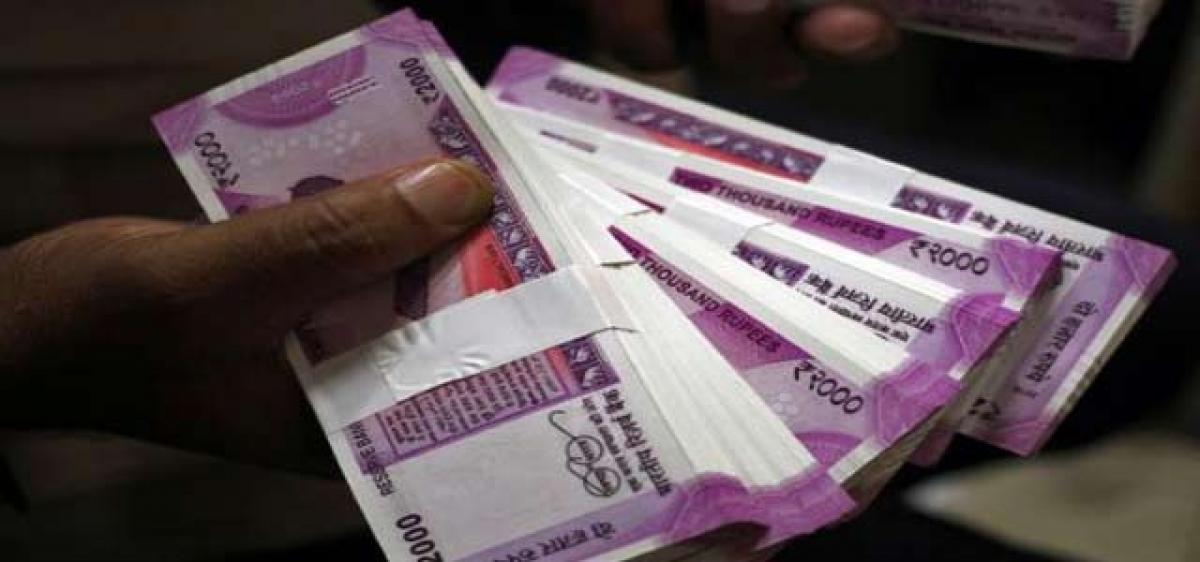Live
- CAG points out increasing debts during 2022-23
- Youth Commits Suicide in Srikalahasti
- MeT department advises TN fishermen to avoid deep sea fishing
- Scientists decode brain activity that can help treat anxiety and depression
- Madarihat loss sees BJP’s tally in Bengal Assembly down to 66
- Sambhal mosque survey: Mob pelts stones at cops, several arrested
- US chipmaker AMD poised to step up investment in India
- Market Outlook: Q2 GDP, FIIs data and global cues key triggers for next week
- Internationalisation of UPI progressing rapidly: RBI
- NHRC Team Visits Sangareddy Jail to Investigate Lagacharla Incident
Just In

The long-term benefits of demonetisation will remain elusive, unless accompanying measures to flush out illicit wealth follow.
The long-term benefits of demonetisation will remain elusive, unless accompanying measures to flush out illicit wealth follow.
Meanwhile, monetary contraction and resultant artificial economic recession will haunt the Indian economy.
The purchasing power of people is severely restricted due to cash crunch as the cash transactions form the most of India’s economic activity.
But, this contraction of purchasing power may be temporary and the disruption caused due to demonetisation in sales of goods in the retail sector may not be of a long-term concern.
But, the impact of this on production cycle would be much more severe. There is a direct link between consumption, production and thereon.
If the consumption is restricted despite demand in the economy, it will automatically show an adverse impact on the production.
For instance, if the farmer cannot buy seeds, fertilisers and other inputs on time, it will certainly dampen the agricultural production.
The informal sector which accounts for a significant part of India’s national income and major chunk of India’s livelihood opportunities is most hit due to demonetisation.
The cash transactions are the main medium of operation in this sector and the electronic transactions are an exception rather than a norm in the informal economy.
As the international consulting firm Deloitte assessed, there is disruption in the liquidity situation. Commodity transactions and general cash market transactions feel an immediate impact.
Unorganised sector proceedings, including small trade market activities, will remain volatile in the short term.
A negative impact on disposable income is felt along with disruption in the consumption patterns of the general populace.
It is estimated that there may be a negative GDP impact in the current quarter as consumption shock gets transmitted in the system.
However, the quantum and degree of this impact cannot be ascertained at this point of time.
Moody's Investors Service estimated that demonetisation is affecting all sectors of the economy to various extents.
Corporates will see economic activity decline, with lower sales volumes and cash flows, with those directly exposed to retail sales most affected.
The premier agency further estimates that the demonetisation will significantly disrupt economic activity, resulting in temporarily weaker consumption and GDP growth. Implementation challenges, in addition to affecting growth and government revenues, will affect corporates by lowering sales volumes and cash flows.
However, the GDP loss and its subsequent recovery would depend on how quickly liquidity returns to the system to restore the transactions.
But, increased volume of bank deposits would create a liquidity surplus for the financial institutions. This would lead to fall in lending rates, thus reducing the capital cost.
This can act as a trigger for increased economic activity by improving investment climate.
Nevertheless, lower lending rates would mean squeezing of income on people’s savings. How these two factors would interplay in the economy is something to be watched.
However, the return of funds to banks would be in the short to medium term only. Besides, continuing monetary contraction would significantly hit the repayments for the banks, thus adversely affecting asset quality.
The government should immediately come out with an action plan to avert sustained economic weakness.
The artificial monetary contraction should be urgently addressed to prevent longer term economic impairment.

© 2024 Hyderabad Media House Limited/The Hans India. All rights reserved. Powered by hocalwire.com







